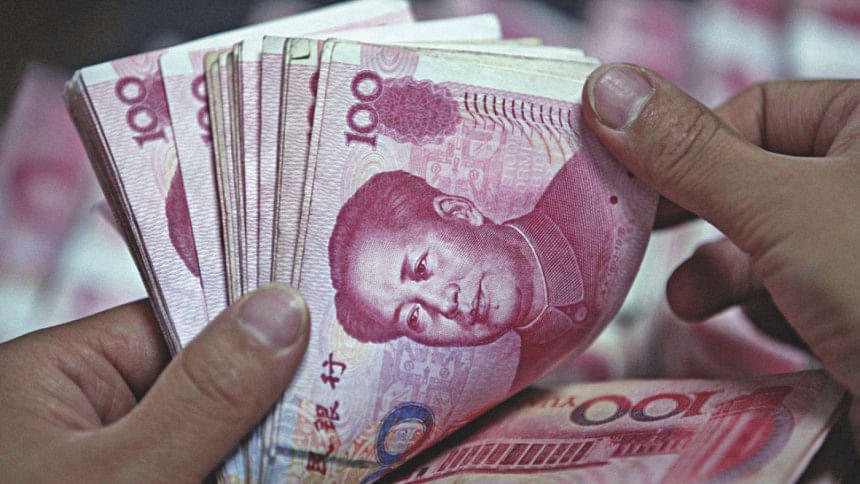Reserve currency: China's new double-edged sword

The year 2015 was not kind to the world's second-largest economy. Growth slumped to a 25-year low. The stock market experienced massive correction, and still many argue that it is overvalued. Trade growth languished in negative terrains for much of the year. Capital outflow escalated while foreign exchange reserves fell by about USD 500 billion. Government stimulus and multiple (monetary) policy rate cuts were not successful in reviving the economy.
One bright spot for China – in an otherwise moribund year – was receiving the IMF's 'Reserve Currency' status. The Renminbi joined the US dollar, pound sterling, Japanese yen and euro in the elite basket of currencies that constitute the IMF's Special Drawing Rights (SDR) – an international reserve asset. What benefits is China likely to enjoy due to this new status? First, it will solidify China's growing geopolitical and strategic role in the international monetary system as Renminbi-denominated transactions gain popularity. Governments will park their wealth in China's currency, raising its international significance. Second, reserve currency holders will receive additional revenue from seigniorage, which entails profit made by a government through increase in the amount of money in circulation. The US government, for instance, traditionally made large profits from wide use of its currency globally. Third, given high demand for reserve currencies, the host country can benefit from lower borrowing costs through reduced bond yields. This can help China shift more easily towards domestic-currency denominated borrowing from foreign-currency debt, which creates exchange rate risk, especially for non-exporters.
On the other hand, reserve currency status comes with its share of obligations. China has to liberalise its capital account to allow unfettered flow of financial assets. China remains the only reserve currency holder where capital flows are highly regulated. It also needs to allow a more flexible exchange rate. The People's Bank of China (PBC) maintains that it is taking steps toward a 'market-based' exchange rate and financial liberalisation. It is important to recognise that transitioning to a flexible regime and capital openness is a daunting task – it could even prove counterproductive to growth, given certain macroeconomic and corporate sector risks in China.
For the purposes of this write-up, it is important to determine if a flexible Renminbi would appreciate or depreciate in a more liberalised capital account regime. On one hand, reserve currency status could raise demand for Renminbi, causing it to appreciate (the US dollar is the best example in this context). This possibility still appears low in the near-term if we balance it with factors which lower demand for China's currency. Given subdued growth prospects, dented image of China's policy credibility, large stock market sell-offs and higher demand for overseas assets, the Renminbi is more likely to depreciate if only markets decided its fate. With the US Federal Reserve poised to steadily raise interest rates over the next 2-3 years, the pace of capital outflow from China could rise dramatically. Episodes of sharp depreciations will no doubt create panic in global markets and raise possibilities of 'competitive devaluation' by neighbouring economies. Competitive devaluation or 'currency wars' stem from countries' motivation to protect their own export competitiveness. Certainly China would want to avoid such geopolitically-sensitive scenarios if it wants to maintain goodwill, protect its growing strategic role in the international financial system and promote the Renminbi's reserve currency status to other countries.
Given persistently weak global demand, it is also doubtful whether depreciation will substantially revive China's exports. For instance, currency depreciations in South Korea and Singapore last year have done little to boost their export growth. Even if we assume China's exports will improve with a lag, such macro benefits should be balanced against any costs imposed upon the economy due to depreciation. The most pressing concern in this regard is China's massive pile of dollar-denominated corporate debt. According to the Bank for International Settlements, this figure is at a mammoth USD 800-850 billion. Foreign currency debt in China – driven by sectors such as real estate, oil and gas, power, metals and mining - escalated since the global financial crisis to take advantage of near-zero interest rates in international markets. While China's reserve is still much higher, it will not necessarily protect exporters (specifically whose foreign currency income is less than foreign currency liability) and non-exporters from exchange rate risks. Depreciating exchange rates will raise the cost of servicing these debts, reducing profits or depleting capital buffers. This is likely to impede future growth, business expansion plans and ultimately China's transition to a more consumption-driven economy.
These underlying risks suggest that exchange rate stability will remain the PBC's policy objective in the short-term. In other words, the very risks associated with this new status are likely to prevent China from tapping into its full advantages. China needs to accelerate its shift towards a more healthy (albeit slower) consumption-driven growth model. Only then will investor sentiment stabilise, reducing capital outflow and sharp depreciation pressures. Until then, the Renminbi will remain (for want of a better word) a 'quasi' reserve currency.
The writer currently works as a Macroeconomic Analyst for an organisation in Washington D.C. He is a Fellow for the Asian Center for Development in Dhaka. Email: [email protected]

 For all latest news, follow The Daily Star's Google News channel.
For all latest news, follow The Daily Star's Google News channel. 



Comments